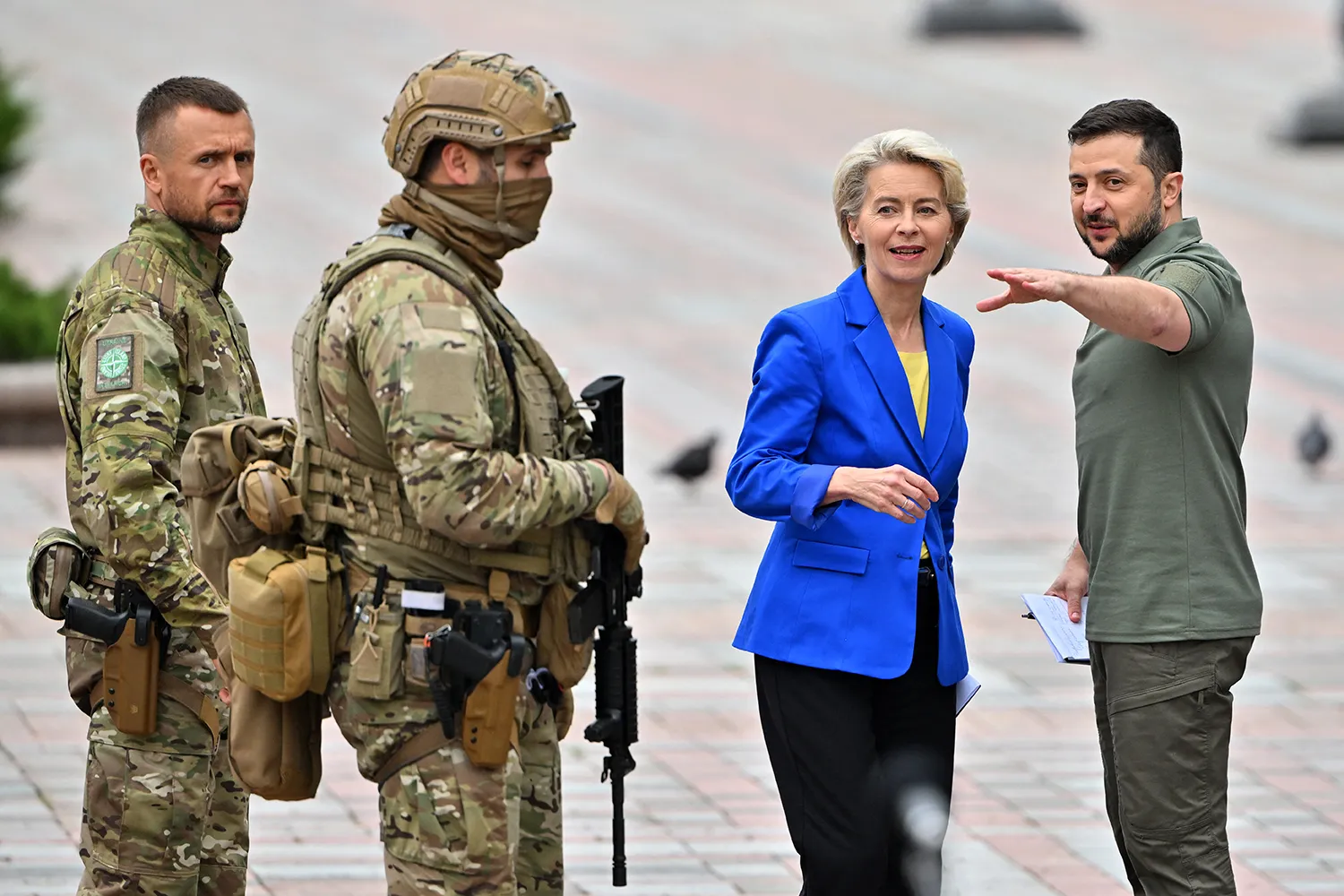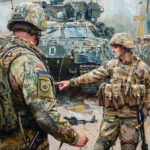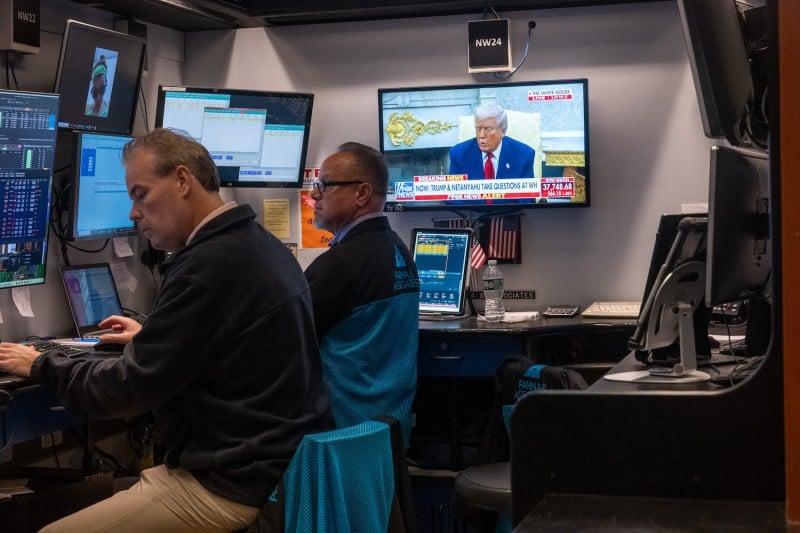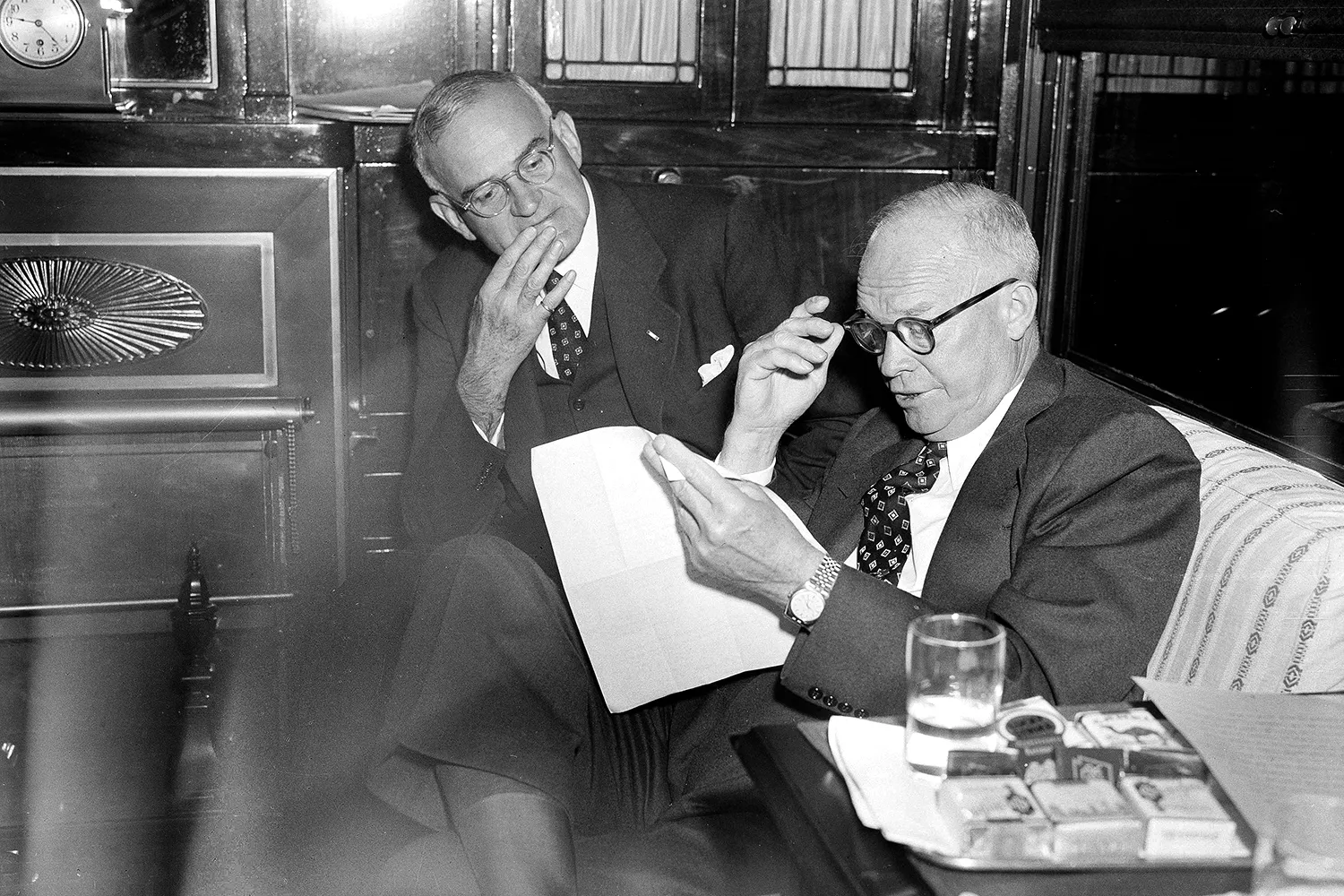Europe Reaps the Fruits of Its Slumber

Analysis
Europe Reaps the Fruits of Its Slumber
Nine thinkers on what’s next for Europe and Ukraine.
Zelensky (right) speaks with Ursula von der Leyen, president of the European Commission, after a press conference in Kyiv on Sept. 15, 2022. SERGEI SUPINSKY/AFP via Getty Images
The West has had three years to end Russia’s war on Ukraine in the latter’s favor. Kyiv begged for more weapons and ammunition, but neither Europe nor the United States delivered what was needed, and they often placed strict limits on what Ukraine could do with the weapons it received. At various points throughout the war, the Ukrainian military proved its capacity to turn Russia’s war of conquest into a failure—and in doing so, restore a European security order based on secure borders and self-determination, even for smaller and weaker countries. In other words, Europe and the United States had the opportunity to aid Ukraine and reject the imperialism that Russian President Vladimir Putin has turned into the raison d’être of his regime—an attitude that led Europe into two world wars and which many in the West believed had been thrown into the dustbin of history forever.
With an end to the war largely on Russia’s terms, as the Trump administration’s actions and statements seem to suggest is in the offing, Putin could claim victory. Conquest by force would be rewarded. An empowered Russia would expand again—on top of its previous occupations and annexations of parts of Moldova, Georgia, and Ukraine after the 2014 invasion. That would send a message to all Russians that, despite their hardships, their leader has brought their country back to the path of glory and global power, teaching rebellious Eastern and Central Europeans a lesson, putting Western Europeans on notice, and leveling the playing field with China, instead of becoming its junior partner. Putin’s gamble would have played off.
The West has had three years to end Russia’s war on Ukraine in the latter’s favor. Kyiv begged for more weapons and ammunition, but neither Europe nor the United States delivered what was needed, and they often placed strict limits on what Ukraine could do with the weapons it received. At various points throughout the war, the Ukrainian military proved its capacity to turn Russia’s war of conquest into a failure—and in doing so, restore a European security order based on secure borders and self-determination, even for smaller and weaker countries. In other words, Europe and the United States had the opportunity to aid Ukraine and reject the imperialism that Russian President Vladimir Putin has turned into the raison d’être of his regime—an attitude that led Europe into two world wars and which many in the West believed had been thrown into the dustbin of history forever.
With an end to the war largely on Russia’s terms, as the Trump administration’s actions and statements seem to suggest is in the offing, Putin could claim victory. Conquest by force would be rewarded. An empowered Russia would expand again—on top of its previous occupations and annexations of parts of Moldova, Georgia, and Ukraine after the 2014 invasion. That would send a message to all Russians that, despite their hardships, their leader has brought their country back to the path of glory and global power, teaching rebellious Eastern and Central Europeans a lesson, putting Western Europeans on notice, and leveling the playing field with China, instead of becoming its junior partner. Putin’s gamble would have played off.
There is no conceivable scenario where this experience would not encourage Putin and his circle to double down on imperialism and territorial expansion by force. Defeat—to be kicked out of Ukraine—might lead to a moment of soul-searching in Russia, weaken Putin’s rule, and open the possibility of change. Victory will put more wind in Putin’s sails and provide him with greater resources for his next steps. Should he get control of all of Ukraine, he will control a vast defense industry, military, and population to deploy against new targets.
For Europe, the risk of a military confrontation is rising steeply. As Putin has made clear in his two draft treaties to the United States and NATO, his goal is for Russia to regain the position of the Soviet Union of his youth: control over Eastern Europe, most of Central Europe, and at least parts of Southeastern Europe—and, as a consequence, dominance in a Europe that has been largely abandoned by the United States.
Russian success in Ukraine does not only mean that Putin would soon try do whatever it takes to get the rest of Ukraine under his control. He also has his sights on Moldova and Georgia, the latter of which is already dominated by a Russia-friendly regime. Next, he would wait for the right moment to attack a NATO country using conventional, hybrid, or other methods and move ahead with regime change and occupation. The primary goal would be to demonstrate that it’s each country for itself—that Western solidarity, as expressed in NATO’s Article 5 and the European Union’s mutual defense clause, are fantasies without foundations.
European leaders had the chance to frustrate Russia’s imperial ambitions early on and cheaply, since it was highly capable Ukrainians doing the actual fighting. All that was required was the fortitude to overcome habitual lethargy and overblown fears—and to realize that this was a unique opportunity to show Russia that wars of aggression and conquest remain taboo in Europe. They were warned, and they failed. The risks of acting then were far lower than the risks they face now. And the money they could have invested in their own security by way of supporting Ukraine is small change compared to what it will now take to mobilize their militaries, industries, and societies to secure their borders against a far more belligerent Russia in the coming years.
This story is part of a collection on what’s next for Ukraine and Europe. Read the full package here.
Ulrich Speck is an independent foreign affairs analyst and a columnist at Neue Zürcher Zeitung. X: @ulrichspeck
More from Foreign Policy
-

A security guard stands at the entrance to the U.S. Agency for International Development (USAID) headquarters on Feb. 3. DOGE Is Hacking America
The U.S. government has experienced what may be the most consequential security breach in its history.
-

A man with a beard in a suit and tie speaks behind a teleprompter. The logo for MSC is behind him. Vance Leaves Europe Gobsmacked
U.S. Vice President J.D. Vance delivered a rebuke on immigration and alleged censorship to a shocked Munich Security Conference.
-

A Palestinian girl carries a child through the rubble of houses destroyed by Israeli bombardment in Gaza City on March 3, 2024. Why Is the World So Polarized on Gaza?
The answer might be linked to race and colonization, explains author Pankaj Mishra, speaking on FP Live.
-

An attendee dressed like Uncle Sam waits for Donald Trump to arrive for a campaign rally at the Mosack Group warehouse on September 25, 2024 in Mint Hill, North Carolina. America Is Its Own Worst Enemy
It’s not unprecedented for a powerful country to simply shoot itself in the foot.








Join the Conversation
Commenting on this and other recent articles is just one benefit of a Foreign Policy subscription.
Already a subscriber?
.
Subscribe
Subscribe
View Comments
Join the Conversation
Join the conversation on this and other recent Foreign Policy articles when you subscribe now.
Subscribe
Subscribe
Not your account?
View Comments
Join the Conversation
Please follow our comment guidelines, stay on topic, and be civil, courteous, and respectful of others’ beliefs.
Change your username |
Log out
Change your username:
CANCEL
Confirm your username to get started.
The default username below has been generated using the first name and last initial on your FP subscriber account. Usernames may be updated at any time and must not contain inappropriate or offensive language.